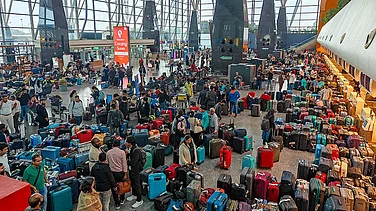Prime Minister Narendra Modi on Wednesday offered prayers at the Shrinathji temple in Nathdwara town of Rajasthan's Rajsamand district.
The prime minister also spent some time in the temple.
People lined up on both sides of the road and showered flowers on the prime minister's cavalcade en route to the temple. The prime minister will later in the day launch development projects costing over Rs 5,500 cr in Rajasthan.
The focus of the projects to be launched by the prime minister will be on bolstering infrastructure and connectivity in the region, the PMO had said, adding road and railway works will facilitate the movement of goods and services, boosting trade and commerce and improving the socio-economic conditions of the people in the region.
Among the projects, Modi will lay the foundation stones for road construction projects for upgradation to two-lane in Rajsamand and Udaipur and for redevelopment of the Udaipur railway station.
Modi will inaugurate three national highway projects, including 114-km long six lane Udaipur to Shamlaji section of NH-48, 110-km long widening and strengthening to 4 lane with paved shoulder of Bar-Bilara-Jodhpur Section of NH-25, and 47 km long two lane with paved shoulder section of NH 58E.
The prime minister will also be visiting Shantivan complex of Brahma Kumaris, a religious organisation.
The PMO noted that a special focus of the prime minister has been on giving impetus to spiritual rejuvenation across the country.
He will lay the foundation stone of a super speciality charitable global hospital, second phase of Shivmani old age home and extension of nursing college.
The hospital will be set up in Abu Road, spread across an area of 50 acres. It will offer world-class medical facilities and will prove especially beneficial for the poor and the tribal people in the region, it said.





















